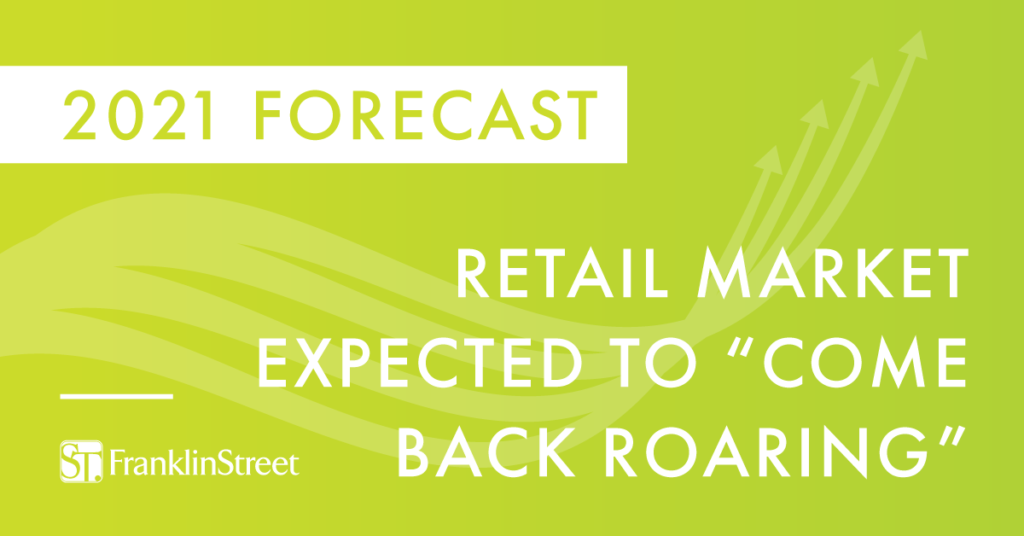From lockdowns and stay-at-home orders to increasing competition from ecommerce companies and food delivery services, retailers faced no shortage of challenges in 2020. Fortunately, many U.S. retail markets have already shown strong signs of recovery.
At Franklin Street, our experts are bullish on the year ahead as retailers pivot to thrive in a post-pandemic world, and the rollout of the COVID-19 vaccine eases consumer concerns about in-person shopping and dining. Below, some of our leading retail leasing brokers reflect on last year’s events and offer their insight and predictions for 2021 retail:
Carrie Smith, Managing Director, Jacksonville

“We went into 2020 seeing some of the highest rents, number of construction starts and sales volumes from retailers, anticipating 2020 being a banner year for the industry. Things were looking that way until March, when there was a literal stop on deals for a couple of months. However, things began to pick back up in the summer and have been steady ever since. Going into this year, we’re predicting a robust 2021 with pipelines showing signs of deal flow very close to pre-pandemic levels.
Retailers and restaurants had to pivot quickly on how to cater to consumers in lockdown. For those that figured it out and excelled at it, I believe the changes they made will last post-pandemic. This includes things like curbside pick-up, more efficient ordering systems and more integrated online platforms that work synergistically with the brick and mortar store.
We may also see more ecommerce and direct-to-consumer brands adopting a brick-and-mortar presence, potentially back-filling space that has become available due to closures and bankruptcies. These brands saw the value in having a fully integrated consumer experience with both online and physical footprints prior to the pandemic and last year’s events reaffirmed that.”
Terrence Hart, Senior Director, Orlando

“The rise of ecommerce was a challenge for traditional retail long before COVID-19, but the pandemic accelerated its impacts. Retailers who were already in the process of adapting their business model to accommodate online interaction are the ones thriving in the pandemic.
Eventually the virus will not be as much a factor, but there are components of the current retail experience that will likely stick. Consumers will continue to expect options for online ordering, so in-person shopping and dining will need to be more experiential than ever. Going forward, I anticipate we’ll see the most activity from retailers and restaurants on either side of the spectrum: those that offer speed and convenience or those that offer a truly unique and worthwhile experience that cannot be replicated at home.
Ultimately, retail may become smaller and more efficient from a square footage standpoint, but at the end of the day the need for retail will always be there.”
Monetha Cobb, Senior Vice President, Atlanta

“In the past nine months, certain types of retail have performed especially well, including healthcare retail like urgent care centers and dentist offices, quick service restaurants like Chipotle and Wingstop and discount stores like Dollar Tree and Family Dollar. We’ve also seen a lot of junior box retailers such as TJMaxx and Bealls / Burkes Outlet taking advantage of the influx of larger box availabilities that have come online due to bankruptcies.
One of the more interesting trends we are seeing now is landlords’ willingness to partner with restaurant groups in order to get them open/operating in their centers. We’re also seeing this at a more macro-level with the investment into JCP by Brookfield and Simon.
The retail market has already started rebounding in many ways as retailers have created safer environments, and I expect it to come back roaring in 2021 as the COVID-19 vaccine helps ease consumers’ minds. People are still going to want to be together eating, dining and experiencing new things outside the home — they just want to feel safe doing it.”
Read part 2 of this blog series on the retail investment sales market here.




